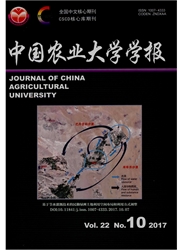

 中文摘要:
中文摘要:
为了重塑番茄在环境因素控制下的生长发育过程,进而实现产量预测,基于库源关系的结构功能互反馈模型GreenLab,结合温室温度、湿度、光照等可控环境因子,研究了生长环境对番茄果实产量的影响。试验结果表明:种植密度不影响植株的营养生长;但果实产量受季节、种植密度影响而不同,随密度增大单株产量下降,而每m2产量上升。环境因素影响植株生长过程中植株物质生产量与器官物质需求量比值Q/D的变化,从而影响坐果率,模型中可利用密度试验数据校准器官的汇源关系,进而确定其变化规律,通过分析不同环境下番茄果实对同化物的竞争水平可实现坐果定量化。
 英文摘要:
英文摘要:
To reproduce and simulate the growing process of tomato under the environmental conditions and realize the prediction of its production yield, the environment effect on fruit yield and quality were studied based on the structural-functional feedback model-GreenLab in response to temperature, humidity and light. The experimental result indicates that the plant density has no effect on plant vegetative growth; while the seasons and plant density influence the yield. Increasing plant density results in an increase of biomass production on a ground area but in a reduction of single plant fresh weights. Environmental conditions and fruit set ratio act on Q/D on plant growth. To find the relationship between organ sink and source a correlative calibration was made on data of different plant densities in the model. Quantification of fruit set depends on the level of competition for biomass in different environments.
 同期刊论文项目
同期刊论文项目
 同项目期刊论文
同项目期刊论文
 期刊信息
期刊信息
